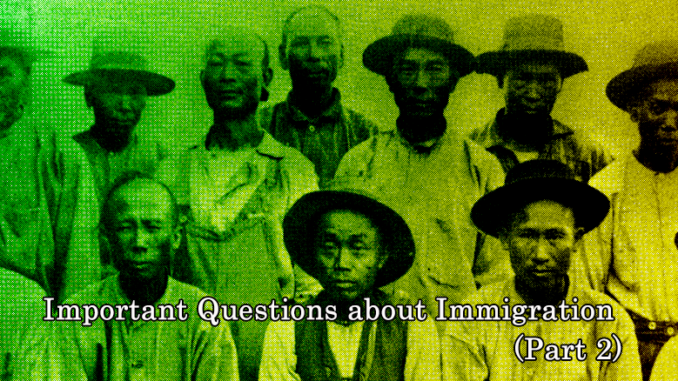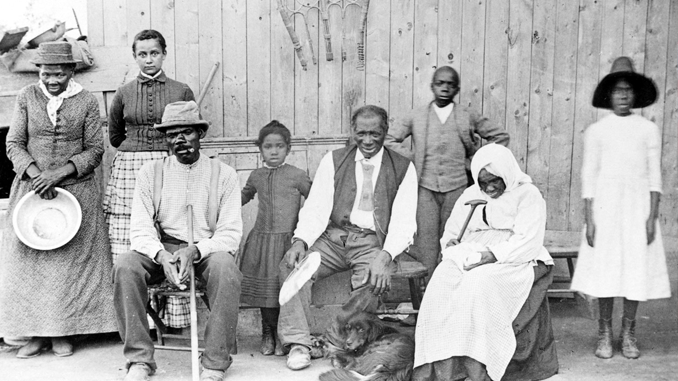
This was originally written as a single editorial, but I have decided to break it down into 3 parts to make it easier for everyone to digest.
Part 1: “A brief History of Immigration laws.”
Part 2: “When did we start enforcing immigration laws and why do they exist?”
Part 3: “Are immigration laws even necessary or is this all just racism and scapegoating?”
Let’s Start Trying to Answer the Questions
When did we start enforcing immigration laws and why do they exist?
In 1798, the President of the United States was given the authority to deport resident immigrants that are deemed a threat to the country; more specifically if their home country is at war with the United States. That authority (although amended), still exists today. However, actual legislation governed by a set of specific rules regarding the immigration of specific groups of peoples seems to have started with the Page Act of 1875. The subsequent Chinese Exclusion Act and its predecessors locked down Chinese Immigration and the importation of Chinese Labor for almost 70 years.
When scrutinized, you’ll find that most of this early immigration legislation had very little to do with bringing people in, but rather, it was all about keeping people out. There were also various provisions for reforming the citizenship requirements and eligibility tucked into these bills, much of which seems exclusionary. It wasn’t really immigration legislation so much as it was anti-immigration legislation.
As evident by the racist language found within that early legislation, these bills seem to result from the general attitude of the times they were written.
In the mid 1800’s, Chinese workers were imported en masse to help with the building of the railroads. Soon afterwards, the booming industrial revolution found a wonderful asset in this newly acquired, very productive, and extremely cheap labor. Chinese workers were imported at such a rate that by the 1870’s they made up 8% of California’s population and 25% of its workforce. Citizens were losing out to people who would do it better, cheaper, and faster. The free market was in full swing, and the people who hate it the worst are the ones who grow too comfortable with the status quo.
You could say the Chinese were taking their jobs, but it’s likely new jobs were also being created because of the influx of the Chinese labor force. If your skill set is not up to par enough that you can be replaced by unskilled labor, than maybe it’s time to get some new skills?
Unfortunately, for the Free market and the industries thriving from it, pissed off, disenchanted, unemployed people vote. Since voters hold more weight then booming industries with the people who make the laws, you can bet which side the legislators caved too. Even then, they were often into politics primarily for power and financial gain. Hell hath no fury like a pack of angry voters in November.
With animosity over the Chinese immigrant population growing to a fevered pitch, and their bizarre customs clashing with life rapidly changing the old west, it’s not all that surprising that people would go to such lengths to ensure what they probably perceived was necessary for their survival. Even if it’s just the survival of a way of life that they were accustomed to being constantly disrupted at every single turn.

Photo by William H. Cheney.
Remember, at this time we were also coming out of the Civil War, and more importantly, Emancipation. A large number of citizens at this time were still really pissed off that black people were no longer considered property, but free people allowed to find their own destiny in society. They were now forced to rub elbows with people they used to treat like dogs. It’s easy to shift gears to another scapegoat when you’ve lost some big ideals you were willing to shed blood and treasure for. I wouldn’t even be surprised if even many newly freed slaves were also pissed off to find Chinese people getting favorable attention and money for the things they were forced to do for free previously.
I’m willing to guess that a tipping point was eventually reached, and The Page Act of 1875, and its supporting pieces of legislation, was one of many results.
The funny thing about our Republic is that, with a few exceptions, once a legislative door is open, it’s really hard to close it. It’s much easier to amend it or fix it than repeal it, but even then, the underlying legislation seems to set precedents for future actions. I suspect the immigration acts of 1907 through to 1924 were all a result of such precedents. During that time, the flood gates were open and the lists of people based on nationality, geography, personal traits, organizations, religious affiliations, and sexual preferences, excluded from immigrating was exhaustive. It was also totally unconstitutional for congress to make these laws, as the First Amendment specifically prohibits it. Future SCOTUS rulings bear this out, finding that immigrants, whether legal or otherwise, are fully protected under the constitution and are afforded the same due process rights as a citizen and are further protected under the 14th and 5th amendments.
In 1952, the Immigration and Nationality Act was a sort of catch all, comprehensive bill to wrap all of these extraneous pieces of legislation into one clean, authoritative package. Unfortunately, it also served to pretty much normalize and solidify a permanence of immigration laws into our society.
Future laws, quota initiatives, policy changes, and executive memos, such as the Immigration Reform and Control Act of 1986 and DACA, while intended to relieve pressure on immigrants, still ignore the bigger question and serve to strengthen the status quo. These laws appeal to a narrative that largely exists because it always has.
Now that we’ve addressed this, we are ready to tackle the bigger question.
Part 3: “Are immigration laws even necessary or is this all just racism and scapegoating?”

2 Trackbacks / Pingbacks
Comments are closed.